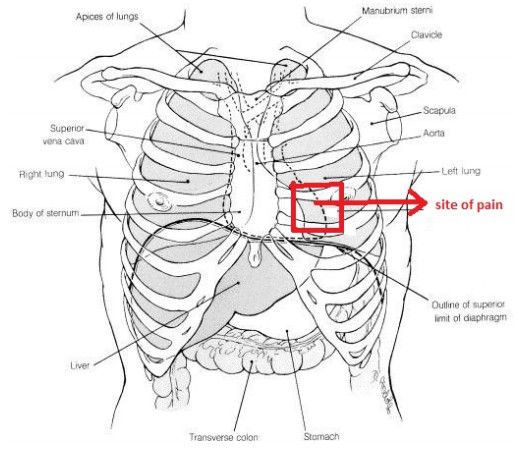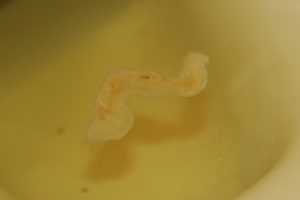If you experience sharp pain in your chest then you don’t need to panic because it does not cause any harm and the pain goes away on its own. It is a medical condition called precordial catch syndrome. Many people relate it with a heart attack but in reality, it does not have any similarity with a heart attack and it is not life-threatening as well.
Contents
What is precordial catch syndrome?
The term precordial means ‘in front of the heart’. So precordial catch syndrome clearly defines the condition when you experience sudden pain in the front of your chest that lasts only for a few seconds and disappears on its own. Another name for precordial catch syndrome is the Texidor’s twitch. Apart from children, precordial catch syndrome in adults is also common.
How common is precordial catch syndrome?
This condition is very common among children between the ages of 6 and 12. Both males and females can suffer from precordial catch syndrome. However, it is infrequent among adults. The doctors are also of the view that when a child crosses the age of 20 then this condition becomes less common. You have to take very good care of your child both physically and mentally because studies have shown that the children who are under constant stress and anxiety are likely to get precordial catch syndrome. However, the actual reason for this condition is still not known. Also, you have to note the posture of your child because poor posture leads to problems like Texidor’s twitch.
Precordial catch syndrome symptoms:
A clear sign of precordial catch syndrome is sharp pain and discomfort in the chest. The pain occurs at a specific area of your chest it gets worst when you take deep breaths. There are no other symptoms of this condition and one must know that this kind of pain occurs when you are at rest. The pain lasts for a few seconds or minutes and comes to an end on its own. This type of pain will not spread out to other parts of your body. The seriousness of the pain depends on person to person. For some people, it is dull while for others it is more intense and sharp. This pain is not associated with other symptoms like paleness, nausea, vomiting, etc.
What causes precordial catch syndrome?
How do you get precordial catch syndrome is the inquiry of most of the people. There is no clear-cut reason behind precordial catch syndrome. The medical experts say that this chest pain occurs when the nerve in the lining of the lungs is irritated. This kind of nerve pinching may be due to incorrect posture or because of any injury. One must know that this pain has nothing to do with the heart and lungs. The exact cause of this pain is still unknown however the doctors may relate it with stress and anxiety.
How is precordial catch syndrome diagnosed?
If your child complains about sudden chest pain then you need to consult your doctor immediately. First of all your doctor will rule out a heart problem or a lung emergency. Upon getting your child’s medical history, he will be able to understand the symptoms of this stabbing pain. Apart from chest pain, he will be concerned about its duration. Usually, physical examination of the chest is enough to diagnose precordial catch syndrome. The people who ask that is precordial catch syndrome serious must know that this isn’t a serious medical condition because the pain goes away on its own and you don’t need instant medical emergency.
How long does precordial catch syndrome last?
Most of the people who complain about this pain must know that the sudden episodes of pain last between 30 seconds 3 minutes. However, it differs from person to person. For some people, this pain disappears after a few seconds while for others it may last a bit longer.
Is precordial catch syndrome genetic?
This is most common among children and teenagers and according to health experts, this medical condition is not genetic. As a person gets older, the episodes of this pain get less common. According to the doctors, there is some connection between precordial catch syndrome and anxiety because children with stress most commonly get this problem. If your child complains about sharp chest pain then occasional deep breathing will help to prevent this problem in the days to come.
Precordial catch syndrome vs costochondritis
Chest pain in children is a common problem that is caused by precordial catch syndrome or by costochondritis. Costochondritis is the inflammation of the joints connecting the ribs to the sternum. Children can get this problem when they cough a lot or laugh too much. So both these conditions are very common in children but they are very different from each other.
How to treat precordial catch syndrome?
The precordial catch syndrome treatment is done through any pain reliever and there isn’t any specific treatment for this problem because this type of pain goes away on its own. You need to get deep breaths which may be hurting initially but will give you relief from this pain. So for the next time, you need to improve the posture of your child to avoid this pain.
Final words:
Precordial catch syndrome is a condition that is very common among children and teenagers in which a person experiences sharp pain at the front part of the chest. This needle-like pain in children increases when you breathe in. You don’t need to worry about it because this kind of pain disappears on its own. There isn’t any true cause of precordial catch syndrome in children however the doctors say that the children who are under stress and anxiety are likely to get this problem. You need to wait for a few seconds because after this duration the pain will disappear. There isn’t any proper treatment for this condition and usually, the doctors recommend pain relievers to soothe the stabbing pain. So, make sure your child has a correct posture which is very important to avoid this pain in the future.










